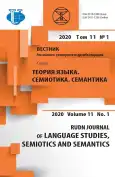Алиса из сказок Л. Кэрролла как персонаж и как языковая личность
- Авторы: Рядчикова Е.Н.1, Кадилина О.А.2, Бальян А.М.3
-
Учреждения:
- Кубанский государственный университет
- Московский государственный юридический университет имени О.Е. Кутафина (МГЮА)
- Кубанский государственный медицинский университет Минздрава России
- Выпуск: Том 11, № 1 (2020)
- Страницы: 64-77
- Раздел: КОГНИТИВНЫЕ ИССЛЕДОВАНИЯ
- URL: https://journal-vniispk.ru/2313-2299/article/view/323267
- DOI: https://doi.org/10.22363/2313-2299-2020-11-1-64-77
- ID: 323267
Цитировать
Полный текст
Аннотация
Актуальность данной работы определяется важностью изучения проблемы языковой личности ребенка как персонажа художественного произведения в лингвопрагматическом ключе, с позиции интенций и особенностей языковой личности писателя, и недостаточной изученностью лингвистического аспекта произведений Льюиса Кэрролла о приключениях Алисы. В работе обосновывается следующее: в противовес тому, что в силу онтологических особенностей, индивидуальности умственного, психического и физического развития и роста личности, степени овладения ею языком и коммуникативными навыками дети младшего школьного возраста обычно являются слабыми или усредненными языковыми личностями, персонажи художественных произведений этого возраста способны соответствовать параметрам сильной языковой личности. Установлено, что предпочитаемые, высоко оцениваемые Л. Кэрроллом качества семилетней английской девочки - это превосходящий развитие среднего ребенка данного возраста уровень когнитивно-речевого развития, речемыслительных процессов, словарного запаса, умения общаться, рефлексировать, делать выводы, оценивать и выражать свое мнение словами, интеллекта, а также внутренние качества Алисы, проявляющиеся в процессе ее речевой деятельности, с учетом не только особенностей речи, но и тематики и стилистики, стратегий и тактик коммуникативного общения, прагматики, адекватности восприятия и понимания речи собеседника, паралингвистических способов воздействия на оппонента, психоэмоционального фона общения. Эти качества позволяют характеризовать данную языковую личность литературного персонажа как сильную. Ряд качеств Алисы позволяет причислить ее к национально-культурному английскому типу личности.
Об авторах
Елена Николаевна Рядчикова
Кубанский государственный университет
Автор, ответственный за переписку.
Email: e.n.ryadchikova@gmail.com
доктор филологических наук, профессор, профессор кафедры общего и славяно-русского языкознания филологического факультета
ул. Ставропольская, 149, Краснодар, Российская Федерация, 350040Ольга Александровна Кадилина
Московский государственный юридический университет имени О.Е. Кутафина (МГЮА)
Email: olgakadilina@gmail.com
кандидат филологических наук, старший преподаватель
ул. Садовая-Кудринская, 9, Москва, Российская Федерация, 125993Ашхен Мурадовна Бальян
Кубанский государственный медицинский университет Минздрава России
Email: ash.balian@yandex.ru
преподаватель
ул. Седина, 4, Краснодар, Российская Федерация, 350063Список литературы
- Tarasenko, E.V. (2005). A fragment of speech portrait: primary school student (syntactic level) In Actual problems of theoretical and applied linguistics: Interuniversity scientific journal. Krasnodar. Part 2. pp. 172-181. (In Russ.).
- Desyaeva, N.D. The linguistic personality of the child and the ways of its formation in elementary school. URL: http://yspu.org/images/5/53/DesyaevaND.pdf. (accessed: 08.08.2017). (In Russ.).
- Sedov, K.F. (1999). The formation of oral discourse structure as an expression of a linguistic personality evolution [dissertation]. Saratov: Pedagogical Institute of Saratov State University n.a. N.I. Chernyshevsky. (In Russ.).
- Kuzmina, I.S. (2009). Cognition and pseudocognition as a text phenomenon (based on the material of a children's literary fairy tale in English) In Linguistic and extralinguistic problems of communication: theoretical and applied aspects: interuniversity collection of research papers with international participation. Vol. 7. Saransk: Publishing House of Mordov University. pp. 250-255. (In Russ.).
- Bilan, T. (2015). Alice’s Adventures in Scienceland. Libri & Liberi, 4 (2), 313-340.
- Karaulov, Y.N. (2010). Russian language and linguistic personality. Moscow: Publishing house LCI. (In Russ.).
- Derbisheva, Z.K (2014). Linguistic personality of Ch. Aitmatov: mental formulas. RUDN Journal of Language Studies, Semiotics and Semantics, 5(3), 35-45. (In Russ.).
- Tripolskaya, T.A. & Goncharova, E.A. (2014). Dynamic processes in the lexicon of a language personality. Novosibirsk State Pedagogical University Bulletin, 4(3), 57-67. DOI: http://dx.doi.org/10.15293/2226-3365.1403.06. (In Russ.).
- Kadilina, O.A. & Ryadchikova, E.N. (2018). Strong, weak and average linguistic personality in communicative-pragmatic and linguoculturological aspects. RUDN Journal of Language Studies, Semiotics and Semantics, 9 (4), 859-882. doi: 10.22363/2313-2299-2018-9-4-859-882.
- Ryadchikova, E.N. & Kadilina, O.A. (2009). Organization of a linguistic personality as a linguistic-cultural phenomenon In Studies in theoretical and applied linguistics. Krasnodar: KubSU. pp. 50-83.
- Vinogradov, V.V. (1930). About fiction. Moscow-Leningrad: State Publishing House. (In Russ.).
- Smirnova, A.A. (2011). The linguistic personality of the character of a literary work and the psychotype of a person (for example, the works of M.A. Bulgakov) [dissertation]. Moscow: MGOU. (In Russ.).
- Churilina, L.N. (2002). Lexical structure of literary text: principles of anthropocentric research. SPb. (In Russ.).
- Ryadchikova, E.N. & Tarasenko, S.V. (2007). Linguistic and cultural principles and ways of reflection of national consciousness and national culture in language. The Bulletin of the Adyghe State University, the series "Philology and the Arts", 3 (26), 13-20. (In Russ.).
- Zakhoder, B. (1990). No chapter from which one can nevertheless learn something In L. Carroll. Alice's Adventures in Wonderland. Krasnodar: Publishing house. pp. 6-12. (In Russ.).
- Ryadchikova, E.N. & Tkhakushinova, Zh.B. (2009). Speech etiquette as an indicator of a strong linguistic personality of a politician. The Bulletin of the Adyghe State University, the series "Philology and the Arts", 4, 150-154. (In Russ.).
- Demurova, N.M. (1985). Notes In Carroll L. The Adventures of Alice in Wonderland. Moscow: Pravda. pp. 296-317. (In Russ.).
- Balyan, A.M., Kushu, S.A. & Zadorozhnaya, E.Y. (2007). Linguocultural features of the English-speaking linguistic personality, ASU Bulletin, 4 (207), 49-56. (In Russ.).
- Ryadchikova, E.N. & Kadilina, O.A. (2011). Distinguishing cultural features of the strong linguistic type of the English speaking personality, Polylinguality & Transcultural Practices, 2, 103-107. (In Russ.).
- Balian, A.M. & Lux, I.G. (2018). The National Specificity of Alice L. Carroll as a Linguistic Personality In Materials of the III International Scientific and Practical Conference «Actual Issues of Modern Philology: Theory, Practice, Development Prospects» (Krasnodar, April 21, 2018). Krasnodar: KubSU, 2018. С. 61-65.
Дополнительные файлы









